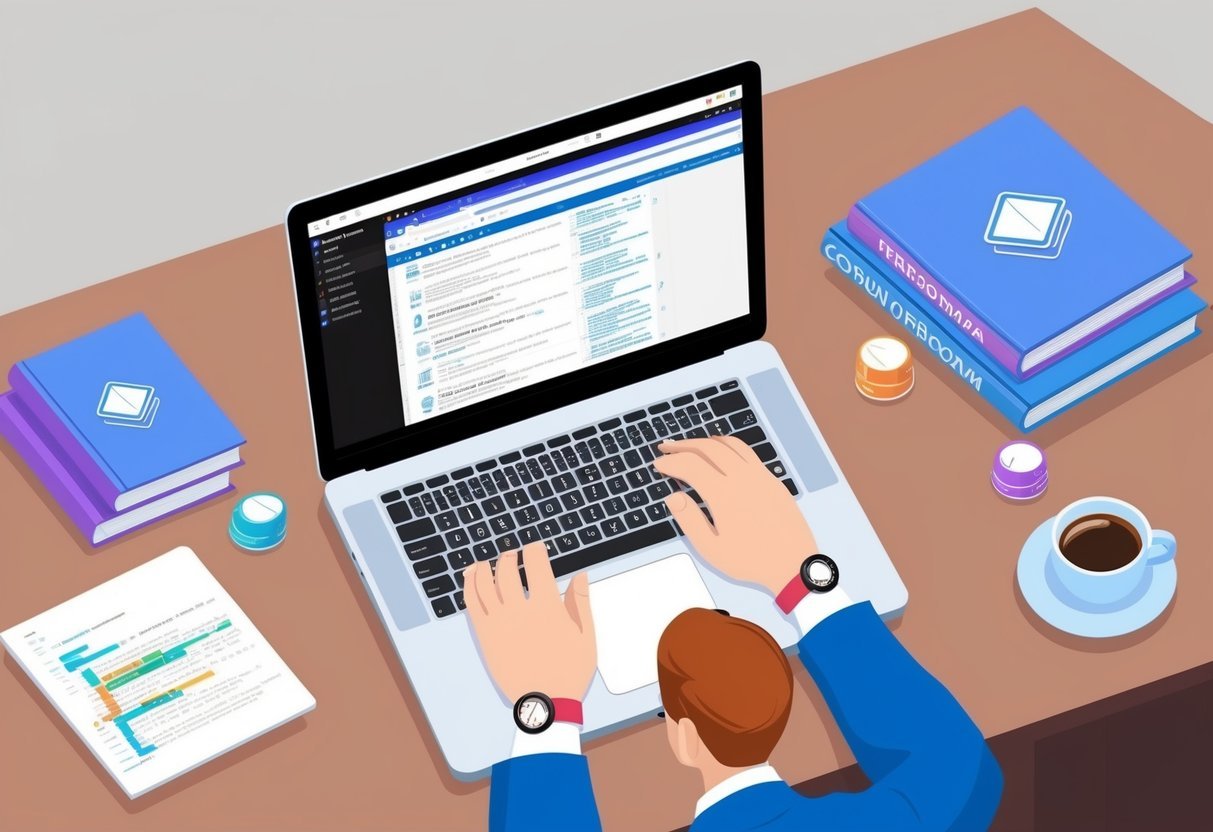A web development side hustle could be your ticket to extra income while doing something you’re passionate about.
As a web developer, you can enjoy a flexible schedule and the opportunity to work on diverse projects.
Freelance web development is a lucrative way to blend creativity with technical skills, offering the potential to significantly boost your earnings.
You might start by working on small projects, such as designing websites for local businesses or improving user experience on existing sites.
Over time, as your skills and network grow, you can explore more lucrative options like building custom e-commerce platforms or developing mobile applications.
Setting up an impressive online presence is crucial; it showcases your portfolio and attracts potential clients.
Platforms like Upwork offer numerous freelance opportunities where you can monetize your skills effectively.
The key to scaling your side hustle lies in continuously learning and adapting to new web technologies.
By consistently delivering high-quality work and engaging with the web development community, you can transform your side hustle into a rewarding and sustainable venture.
Key Takeaways
- Freelance web development offers significant earning potential.
- Building an online presence is essential for attracting clients.
- Continuous learning helps scale and sustain your side hustle.
Getting Started in Web Development

Jump-starting a web development side hustle involves learning essential coding skills and pinpointing where to apply them best.
By grasping fundamental programming languages and finding your niche in the market, you set the foundation for a successful venture.
Understanding the Basics
To start with web development, focus on learning key programming languages.
HTML, CSS, and JavaScript form the backbone of web development.
They allow you to create and style web pages and add interactivity.
Investing time in online tutorials or coding bootcamps can help you grasp these languages efficiently.
Moreover, understanding basic web developer tools such as version control systems, like Git, and text editors is vital.
These tools streamline the development process and enhance productivity.
Websites like Codecademy and FreeCodeCamp offer courses that can guide you through building your foundational coding skills.
Identifying Your Niche
Once you’re comfortable with the basics, it’s crucial to identify a niche that aligns with your interests and skills.
Options range from custom website building to mobile app development or even WordPress theme customization.
Choosing a niche allows you to specialize and stand out in the competitive market.
Consider market demands and your strengths.
For example, if you enjoy creating visually appealing sites, e-commerce website development might suit you.
Conduct some market research and explore platforms like Upwork to identify trending opportunities that match your skills.
This focus not only improves your expertise but also helps attract specific clients looking for specialized services.
Learning and Improving Your Skills

Enhancing your web development skills is essential, whether you’re just starting out or looking to advance.
You’ll find various methods, such as coding bootcamps and online tutorials, to guide you through this process.
Coding Bootcamps
For a structured and immersive learning experience, coding bootcamps are a fantastic choice.
These intensive programs often last a few weeks to several months, providing you with hands-on training in programming languages such as HTML, CSS, and JavaScript.
Bootcamps offer real-world projects that allow you to apply what you’ve learned in a practical setting.
This helps in building a robust portfolio that can attract potential clients or employers.
Career support services, like resume reviews and interview preparations, are also common features of these programs, enhancing your job prospects.
Additionally, you’ll benefit from networking opportunities with instructors and fellow students, which often become invaluable connections in the tech industry.
Consider options like general Bootcamp reviews before enrolling, ensuring that the one you choose meets your career goals and learning style.
Online Resources and Tutorials
Online resources can be incredibly flexible, fitting your learning schedule and pace.
Websites like Codecademy, freeCodeCamp, and Khan Academy offer a wealth of coding tutorials that cover a wide range of topics.
These platforms often provide interactive lessons that teach you how to code by doing, which helps reinforce your skills.
Many of them track your progress, offering a sense of accomplishment as you complete each module.
If video content suits you better, YouTube channels focusing on web development topics can be very useful, offering a comprehensive understanding of both basic and advanced concepts.
Forums and communities like Stack Overflow can complement your learning.
Engaging with other learners and professionals allows you to ask questions and solve coding challenges collaboratively.
This community support can be invaluable, especially when you’re stuck or need different perspectives.
Setting Up Your Online Presence
In the digital age, an online presence is crucial for showcasing your skills as a web developer.
It involves creating a portfolio to highlight your work, starting a tech blog to share insights, and leveraging social media to connect with potential clients.
Creating a Portfolio
A stellar portfolio is your digital business card.
It showcases your skills, completed projects, and personal branding.
It’s essential to include clear examples of your work, such as websites you’ve designed or features you’ve developed.
Use platforms like GitHub or personal websites to display your projects.
Consider adding a brief bio emphasizing your unique skills and experience.
Your portfolio should not just display your technical skills but also convey your problem-solving ability and creativity.
Regular updates are key to showing your latest achievements and skills.
Starting a Tech Blog
A tech blog is a great way to demonstrate your expertise and stay current in the web development field.
Share articles on programming tips, industry trends, or tutorials that can help others.
Blogging platforms like Medium or WordPress make it easy to reach an audience.
Writing about your experiences and challenges offers insights to others and helps build your reputation as an expert.
You can even link your blog to a YouTube channel where you provide video tutorials, further widening your audience and interactive engagement.
Regular posting establishes authority and keeps you connected with tech enthusiasts and clients alike.
Leveraging Social Media
Social media platforms are powerful tools for networking and self-promotion.
Use LinkedIn to detail your professional journey and connect with potential clients or collaborators.
Twitter is excellent for quick updates and sharing industry news.
Instagram and YouTube can showcase short clips or tutorials, reaching visually inclined audiences.
Engaging with tech communities on these platforms can lead to job opportunities and project collaborations.
Social media also allows you to interact with followers, answer questions, and stay engaged with the web development community.
Posting consistently and thoughtfully builds rapport and keeps your online presence vibrant and dynamic.
Building Web Applications
When starting a side hustle in building web applications, you can let your creativity run wild.
You might choose to build productivity tools, create innovative games, or develop niche services that cater to specific audiences.
The possibilities here are nearly endless.
Skills Needed:
- Coding Languages: Familiarity with languages like JavaScript, Python, and Ruby is beneficial.
- Frameworks: Understanding frameworks such as React or Angular can streamline your development process.
Steps to Get Started:
- Identify a Need: Look for problems that a web application could solve.
- Design and Plan: Sketch out your app’s features and user interface.
- Develop: Begin coding, and leverage your skills to create a functional prototype.
- Test: Ensure your application is bug-free and user-friendly by conducting thorough testing.
Building web applications can also be very rewarding by allowing you to learn new skills.
Each project offers a chance to understand different aspects of development, and sharpen your coding abilities.
Engaging with other developers or communities can provide support and inspiration.
For more opportunities, you can also consider selling your web applications or offering customization services to businesses.
These ventures not only provide additional income but can also enhance your professional portfolio.
Consider checking platforms that offer freelance opportunities, such as Upwork, to find web development projects that fit your skillset.
E-commerce and Online Store Creation
Creating an online store is a lucrative venture for anyone looking to make money on the side.
With platforms like Shopify and WooCommerce, setting up an e-commerce store has never been easier.
These tools offer everything you need to start selling products online.
Using Shopify and WooCommerce
When it comes to setting up an e-commerce store, two of the most popular platforms are Shopify and WooCommerce.
Shopify is known for its user-friendly interface, making it ideal for beginners.
It offers a range of customizable templates and integrates with various payment gateways.
Shopify hosts your store on its servers, meaning you don’t have to worry about technical maintenance.
WooCommerce, on the other hand, is a plugin for WordPress and offers unparalleled flexibility.
It’s a great option for those who already run a WordPress site.
WooCommerce provides a range of themes and plugins, allowing you to tailor your online store to your specific needs.
You have full control over your store’s functionality and appearance.
E-commerce Store Setup
Getting your e-commerce store off the ground starts with a solid plan.
Choose a niche that you are passionate about and research your target audience.
Once you’ve nailed down your niche, select the platform that suits your needs—whether it’s Shopify or WooCommerce.
Make sure your product descriptions and images are engaging and informative.
Marketing is crucial to success.
Implement strategies such as SEO, social media marketing, and email campaigns to draw traffic to your online store.
Stay consistent with your efforts and continually analyze your store’s performance.
Mobile and Game Development

Exploring the worlds of mobile app development and game development can open many doors for you.
Both fields offer creative outlets with the potential for significant income, whether through freelancing or launching your own projects.
Exploring Mobile App Development
Embarking on a mobile app development journey means you get to create apps that can make life easier or entertain users.
Learning platforms like iOS and Android is your starting point.
You’ll need to get familiar with programming languages such as Swift for iOS or Kotlin for Android.
Creating a unique and useful app can really set you apart in this space.
Consider apps that solve everyday problems or enhance productivity.
Once your app is ready, you have options—publish it on app stores or work as a freelancer creating apps for clients.
Websites like Upwork list numerous opportunities for freelance mobile app developers.
You have the flexibility to choose projects that match your interests and expertise.
Entering the World of Game Development
Game development is where your creativity meets technical skills.
You’ll likely need to work with game engines like Unity or Unreal Engine, which are central in the game creation process.
Beginners often start with small projects to understand the basics of game mechanics and design.
Your journey can gradually lead you to create more complex and engaging games.
The industry is competitive, but there are many ways to distribute your game, from app stores to online gaming platforms.
If you enjoy blending storytelling with technology, an exciting path awaits.
As with app development, you can also find freelance projects through various platforms to build your experience and portfolio.
Freelance Opportunities
Platforms and Tips for Freelancers
To get started with freelance web development, check out platforms like Upwork, Fiverr, and Freelancer.
These sites let you connect with clients who need web development services.
Creating a detailed profile with a portfolio of your work can help you stand out.
Freelancing isn’t just about finding jobs; it’s also about managing your time and resources.
Use task management tools like Trello or Asana to keep track of project deadlines and workflow.
Keep honing your skills and stay updated with the latest web development trends to remain competitive.
Managing Client Relations
Managing client relations is crucial in freelance web development.
Good communication sets the stage for successful projects.
Make sure to clarify project requirements before you start to avoid misunderstandings later.
Set realistic deadlines and keep clients informed of progress regularly.
This transparency builds trust and helps manage expectations.
Use contracts to outline project scope and payment terms to protect both parties.
Don’t be afraid to ask for feedback and ensure any concerns are addressed promptly.
Fostering long-term relationships with clients can lead to repeat business and referrals, bolstering your freelance career.
Monetizing Your Skills

Turning your web development skills into extra income is totally doable.
Two popular ways are affiliate marketing and advertising.
Each offers unique benefits and requires different strategies, but both can truly amp up your income stream.
Affiliate Marketing Strategies
Affiliate marketing can be a superb way for web developers to earn cash on the side.
You can join affiliate programs that align with web development tools or services.
By promoting these products through your website or blog, you earn a commission for each sale made through your referral links.
To start, create engaging content that naturally incorporates affiliate links.
Think tutorials, reviews, or resource guides.
Be transparent with your audience about affiliate links to build trust.
Make sure the products you promote are relevant and of high quality, enhancing your credibility.
The key is choosing programs that resonate with your audience’s needs.
Advertising and Sponsorships
Advertisements and sponsorships are another way to monetize your web development skills.
You can host ads on your website or collaborate with brands for sponsored content.
Tools like Google AdSense make it easy to display ads relevant to your audience, earning you a portion of the ad revenue generated from clicks or impressions.
Sponsorships might involve writing posts about a particular product or service, or even featuring it prominently on your site.
You can reach out to companies that align with your site’s niche.
It’s important to maintain balance—too many ads can drive visitors away.
A clear, strategic approach will help maximize your earning potential from advertising.
Growing and Scaling Your Side Hustle

Growing your web development side hustle starts with efficient time management.
Balancing your main responsibilities with your side projects requires clear prioritization.
Create a schedule that dedicates specific hours to your hustle each week and stick to it.
Consider expanding your skillset to meet more client needs and open up new opportunities.
For example, mastering platforms like WordPress or Shopify can attract a wider client base.
These skills help you tackle diverse projects, from e-commerce sites to blogs.
Client acquisition is crucial for growth.
Networking plays a significant role here.
Use social media to connect with potential clients and engage in industry events.
Building relationships can lead to valuable referrals and recurring work.
Keep a portfolio of your work.
A diverse portfolio showcases your abilities and attracts potential clients.
Highlight a variety of projects to show versatility and expertise.
Regularly update this with new projects to keep it current.
Quick Tips
- Prioritize tasks and set clear goals.
- Learn new platforms like WordPress.
- Network at events and online.
- Update your portfolio frequently.
Website maintenance is another avenue to scale.
Regularly maintaining and updating clients’ websites can provide a steady stream of income and ensure long-term relationships.
This ongoing service offers an opportunity for recurring revenue.
Tracking metrics is key.
Monitor website traffic, conversion rates, and client feedback to measure success and identify areas for improvement.
Tools like Google Analytics can help you understand what’s working and what isn’t, guiding your strategies for growth.
Scaling a side hustle involves identifying and seizing opportunities.
Stay open to diversifying your offerings and be proactive about seeking new projects.
The effort you put in now lays the foundation for a successful and fulfilling side hustle.
Working with WordPress
When you’re diving into the world of side hustles, WordPress can be your best friend.
It’s versatile and user-friendly, which makes it perfect for beginners and seasoned developers alike.
You can create anything from a simple blog to a complex e-commerce site.
Here’s a quick overview of what you can do:
- Build custom websites: Use themes and plugins to give your site a unique touch.
- Theme customization: Tailor existing themes to meet client needs.
- Create plugins: Develop and sell plugins to enhance site functionality.
Need to pick up new skills? Harness the power of WordPress tutorials available online.
You’ll be amazed at how much you can learn by just watching a few videos or taking some online courses.
WordPress allows you to design websites without a huge budget.
By using themes and plugins, you can save some cash while still offering professional services.
Platforms like GeoDirectory can provide valuable resources and insights.
Working with WordPress also opens up opportunities to join a vibrant community.
You’ll find forums full of people willing to help and collaborate.
This can be invaluable when you’re trying to solve tricky problems or when looking for inspiration.
Remember the possibilities are endless.
Whether you want to focus on custom website building or plugin development, WordPress provides the resources you need to kickstart your side hustle journey.
Frequently Asked Questions
Jumping into a web development side hustle from home can be pretty exciting.
You’ll need some savvy skills, the right platforms, and smart time management, especially if you’re juggling a full-time job.
Let’s explore some specifics.
What are the best ways to start a web development side hustle from home?
Getting started involves building a solid portfolio showcasing your skills.
Use platforms like WordPress or GitHub to create a personal website.
Engaging in online communities or taking online courses can also help improve your skills and visibility.
How can I balance a full-time job with a web development side hustle?
Balancing both can feel like juggling, but effective time management is key.
Prioritize tasks and set specific time blocks for side projects.
It’s crucial to communicate clearly with clients and manage expectations to avoid burnout.
What’s the most effective strategy to find clients for my web development side hustle?
Networking is crucial.
Attend industry events or engage in social media forums.
Showcasing your work on platforms like LinkedIn or through a dedicated website can help attract potential clients.
Consider expanding your network through freelancing websites to gain more visibility.
What platforms should I consider for finding web development side hustle opportunities?
Platforms like Upwork or Freelancer.com are popular among web developers looking for side gigs.
These sites provide access to a variety of projects and can be an excellent way to earn extra income by leveraging your existing skills.
Check out Gigworker for more ideas on where to start.
How do web developers on Etsy successfully market their side hustle?
Etsy might not be the first place you think of, but developers sell digital products like website templates and plugins successfully there.
Highlight unique offerings and optimize product descriptions with SEO-friendly keywords to reach the right audience.
Joining social media groups can also help in marketing efforts.
Are there any specific tools or skills I should learn to be successful in web development side hustles as we head into 2024?
To stay ahead, you should master modern tools like WordPress, Shopify, and Adobe Creative Cloud.
Additionally, broadening your skill set to include knowledge of JavaScript frameworks or focusing on UX/UI aspects can make you more attractive to clients looking for complete solutions in their projects.


